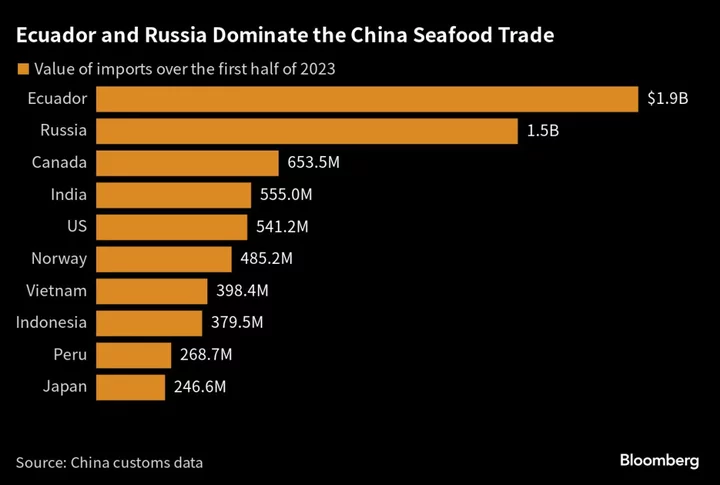Japan’s release of treated radioactive wastewater into the sea has sparked outrage across China, triggering a ban on imports and pushing consumers to vent their anger. Some have even started hoarding salt.
Tokyo’s move prompted swift retaliation from Chinese authorities, who banned all Japanese seafood imports starting Thursday. The announcement was met with broad support from the Chinese public, and also triggered anger among some over what’s seen as “selfish” behavior by the Japanese government.
A piano teacher with the surname Li vented her anger on the WeChat messaging app, saying Japan’s move will hurt everyone. “They’ll get their just deserts,” she said. “How long do they expect to live if they don’t protect the environment?”
The Chinese government has led criticism of Tokyo’s plan to release treated water from the ruined Fukushima nuclear plant, saying the ocean isn’t Japan’s private sewer. The reaction from consumers reflects public worries as well, even though the International Atomic Energy Agency said the move is in line with global safety standards and would have a negligible impact on people and the environment.
Some consumers rushed to stock up on salt due to concern the water discharge would affect the safety and future availability of the condiment. This is reminiscent of an episode in 2011 after the Fukushima nuclear disaster, when Chinese shoppers cleared shelves on speculation iodized salt can help ward off radiation poisoning.
Alibaba’s Hema Fresh, a popular grocery app, sold out of salt on Thursday. Sales on Dingdong, a main e-commerce platform in China, soared over the last two days and the company was also out of stock by Thursday evening. Dingdong said it intends to increase the supply of alternative condiments like mineral salt and soy sauce to meet demand.
See: China Bans Japanese Seafood as Nuclear Wastewater Released
Frank Tsai, adjunct professor of international studies at Xi’an Jiaotong-Liverpool University in Suzhou, said Beijing’s ban on Japanese seafood imports gives China the “moral high ground vis-à-vis Japan.”
“It can claim to be speaking for other Asian countries which have also criticized Japan,” he said. “It accomplishes both domestic popularity and adds one more to the litany of popular grievances in China about Japan.”
Tensions between the two countries have flared from time to time, usually over territorial and historical disputes. In 2012, they escalated after Japan’s cabinet approved the purchase of some islands in a chain known as Diaoyu in Chinese and Senkaku in Japanese from a private Japanese owner. China’s government reacted angrily to the move, prompting protests and consumer boycotts across a range of products.
More recently, Japan has pursued closer security ties with the US and joined Washington in controlling exports of chip-making equipment, angering China.
The ban on Japanese aquatic products may benefit other exporters. Chinese media reported that several Japanese restaurants operating in the country have stopped using products sourced from Japan, and are replacing them with seafood from domestic sources and other nations instead.
Mark Tanner, managing director of Shanghai-based marketing firm China Skinny, which gauges buyer sentiment for clients, said consumer views toward Japanese goods may take a hit. Many are not convinced there’s been effective removal of radioactive substances, he said.
“Japanese brands have long held this really positive perception — almost being on a pedestal — with Chinese consumers that are considered better quality of high craftsmanship, clean, healthy,” he said.
While he doesn’t think that idea will disappear, “Chinese consumers may have that view clouded a little bit with some of the negative Japanese sentiment that has happened as a result of the water dumping,” he added.
State media reports about the food safety dangers caused by the wastewater discharged have also fueled fears, some of them outlandish. The Global Times posted an illustration on X, the social media site formerly known as Twitter, of a sea creature rising from the ocean apparently spawned by radiation.
A Fujian-based insurance manager surnamed Chen posted a video clip of the Fukushima plant and said: “The Earth can survive without Japan, but not without the ocean.”
For other consumers, news of the import ban offered a chance to splurge on their favorite Japanese delicacies before the regulations begin to really hit.
“Eat as much seafood as you can,” a bond trader surnamed Li said.
--With assistance from Charlie Zhu, James Mayger, Jing Li, Zhu Lin, Dan Murtaugh and Ben Sharples.









